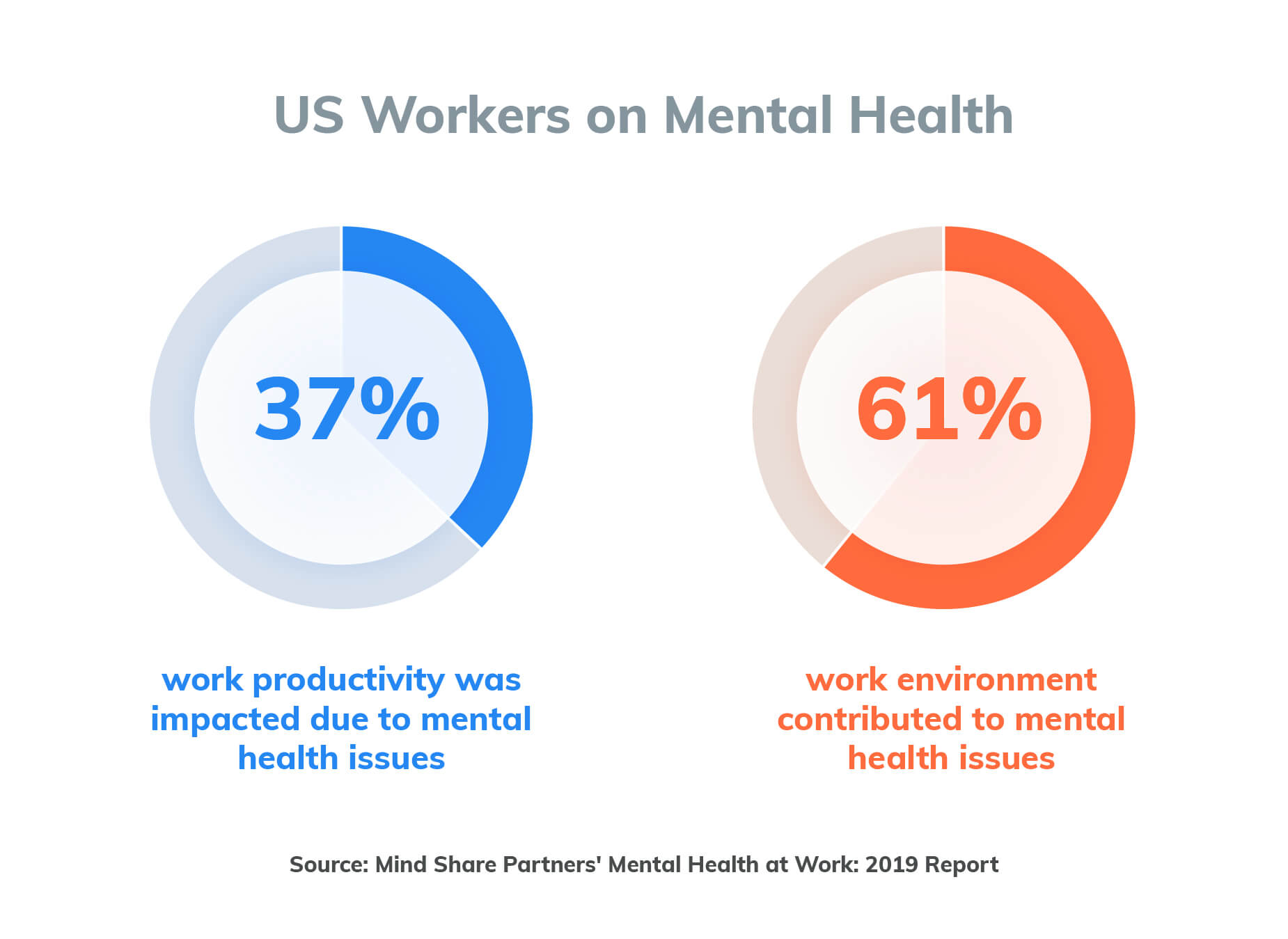Mental Health In The Workplace: How Policy Drives Productivity

Table of Contents
The Economic Impact of Neglecting Mental Health
Ignoring the mental health needs of employees carries significant economic consequences. A proactive approach to mental health in the workplace is not just ethically sound; it's also financially responsible.
Reduced Productivity and Increased Absenteeism
Poor mental health directly impacts employee output. Employees struggling with anxiety, depression, or other mental health conditions often experience reduced concentration, decreased motivation, and increased errors. This translates to lower productivity and missed deadlines.
- Decreased efficiency: Tasks take longer to complete, leading to project delays and lower overall output.
- Increased errors: Mistakes become more frequent, requiring additional time and resources for correction.
- Missed deadlines: Inability to meet deadlines impacts project timelines and overall company performance.
The impact extends beyond reduced productivity. Absenteeism rates are significantly higher among employees with untreated mental health conditions.
- Increased sick days: Employees may take more sick days due to mental health issues, disrupting workflows and increasing labor costs.
- Long-term disability: Severe mental health conditions can lead to long-term disability, resulting in substantial financial burdens for both the employee and the company.
- Presenteeism: Even when present, employees struggling with mental health may experience presenteeism – being physically present but mentally checked out, resulting in decreased productivity.
Higher Employee Turnover and Recruitment Costs
The lack of support for employee mental well-being can lead to high employee turnover. Burnout, stress, and a lack of compassion can drive talented employees to seek employment elsewhere. Replacing these employees comes with significant costs.
- Recruitment costs: Advertising, interviewing, and onboarding new hires are time-consuming and expensive processes.
- Training costs: New employees require training, often at considerable expense, to reach the same level of productivity as experienced employees.
- Loss of institutional knowledge: Departing employees take valuable experience and knowledge with them, impacting company efficiency.
- Negative reputation: High turnover rates can damage a company's reputation, making it harder to attract top talent in the future.
Effective Workplace Mental Health Policies: A Proactive Approach
Companies can significantly improve employee well-being and boost productivity by implementing comprehensive mental health policies. This proactive approach fosters a supportive and productive work environment.
Creating a Supportive and Inclusive Culture
A culture of open communication and empathy is fundamental to addressing mental health in the workplace. Employees need to feel comfortable discussing their mental health without fear of stigma or judgment.
- Implement Employee Assistance Programs (EAPs): EAPs offer confidential counseling and support services, providing employees with access to professional help.
- Train managers on recognizing and addressing mental health concerns: Equip managers with the skills to identify signs of mental distress and offer appropriate support. This includes training on empathetic communication and recognizing different symptoms of mental health issues.
- Promote work-life balance initiatives: Flexible work arrangements, generous paid time off, and reasonable workloads contribute to a healthier work-life balance, reducing stress and burnout. This may include offering remote work options, flexible hours, or compressed workweeks.
Implementing Mental Health Training for Managers and Employees
Providing mental health training empowers both managers and employees to understand, identify, and support each other.
- Mental health first aid training: Equipping employees with skills to identify, understand, and respond to signs of mental health challenges.
- Stress management workshops: Teaching effective coping mechanisms for managing workplace stress.
- Mental health awareness campaigns: Regular campaigns to raise awareness about mental health issues and reduce stigma.
- Peer support programs: Fostering a culture where employees feel comfortable supporting each other and seeking help from colleagues.
Providing Access to Mental Healthcare Resources
Accessible and affordable mental healthcare is crucial. Companies should strive to provide employees with a range of resources to support their mental well-being.
- Comprehensive mental health coverage: Health insurance plans that offer extensive coverage for mental health services, including therapy, medication, and hospitalization.
- On-site or virtual counseling services: Partnering with mental health professionals to provide convenient and accessible counseling services.
- Telehealth platforms and online mental health apps: Providing access to convenient and affordable online mental health resources.
Measuring the Success of Mental Health Initiatives
Measuring the effectiveness of mental health initiatives is essential to ensure continuous improvement. Tracking key performance indicators (KPIs) provides valuable data-driven insights.
Key Performance Indicators (KPIs) for Success
Several metrics can help assess the success of mental health policies.
- Employee satisfaction surveys: Regularly assessing employee satisfaction levels related to workplace well-being and mental health support.
- Reduction in absenteeism and presenteeism rates: Tracking improvements in attendance and overall employee productivity.
- Improvements in employee engagement scores: Measuring increases in employee motivation, commitment, and job satisfaction.
Continuous Improvement and Evaluation
Mental health policies should be regularly reviewed and updated based on feedback and data analysis.
- Regular employee feedback mechanisms: Surveys, focus groups, and one-on-one meetings with employees to gather feedback on the effectiveness of current policies and identify areas for improvement.
- Analyzing data on utilization of mental health resources: Tracking the usage of EAPs, counseling services, and other resources to identify trends and inform policy adjustments.
- Adapting policies to address evolving needs and challenges: Regularly reviewing and updating policies to ensure they remain relevant and effective in meeting employee needs.
Conclusion: Prioritizing Mental Health for Enhanced Workplace Productivity
Strong mental health policies directly contribute to a more productive, engaged, and healthy workforce. Investing in employee mental well-being is not just an ethical obligation; it's a smart business decision that yields significant economic benefits. By reducing absenteeism, improving employee retention, and boosting overall productivity, organizations can significantly improve their bottom line while fostering a happier and healthier work environment. Prioritize mental health in the workplace and reap the rewards of a thriving and successful business. Review and improve your company's mental health policies today to create a workplace where employees feel valued, supported, and empowered to thrive.

Featured Posts
-
 Stroud And Cheltenham Gigs Catch James B Partridge Live
May 02, 2025
Stroud And Cheltenham Gigs Catch James B Partridge Live
May 02, 2025 -
 Priscilla Pointer Dies At 100 Dallas And Carrie Actress Passes Away
May 02, 2025
Priscilla Pointer Dies At 100 Dallas And Carrie Actress Passes Away
May 02, 2025 -
 Kashmir Gets Railway Connection Pm Modis Inaugural Train Date Announced
May 02, 2025
Kashmir Gets Railway Connection Pm Modis Inaugural Train Date Announced
May 02, 2025 -
 100 Year Old Dalla Actress Priscilla Pointer Passes Away
May 02, 2025
100 Year Old Dalla Actress Priscilla Pointer Passes Away
May 02, 2025 -
 Wzyr Altjart Alsewdy Yezz Alteawn Alaqtsady Me Adhrbyjan
May 02, 2025
Wzyr Altjart Alsewdy Yezz Alteawn Alaqtsady Me Adhrbyjan
May 02, 2025
